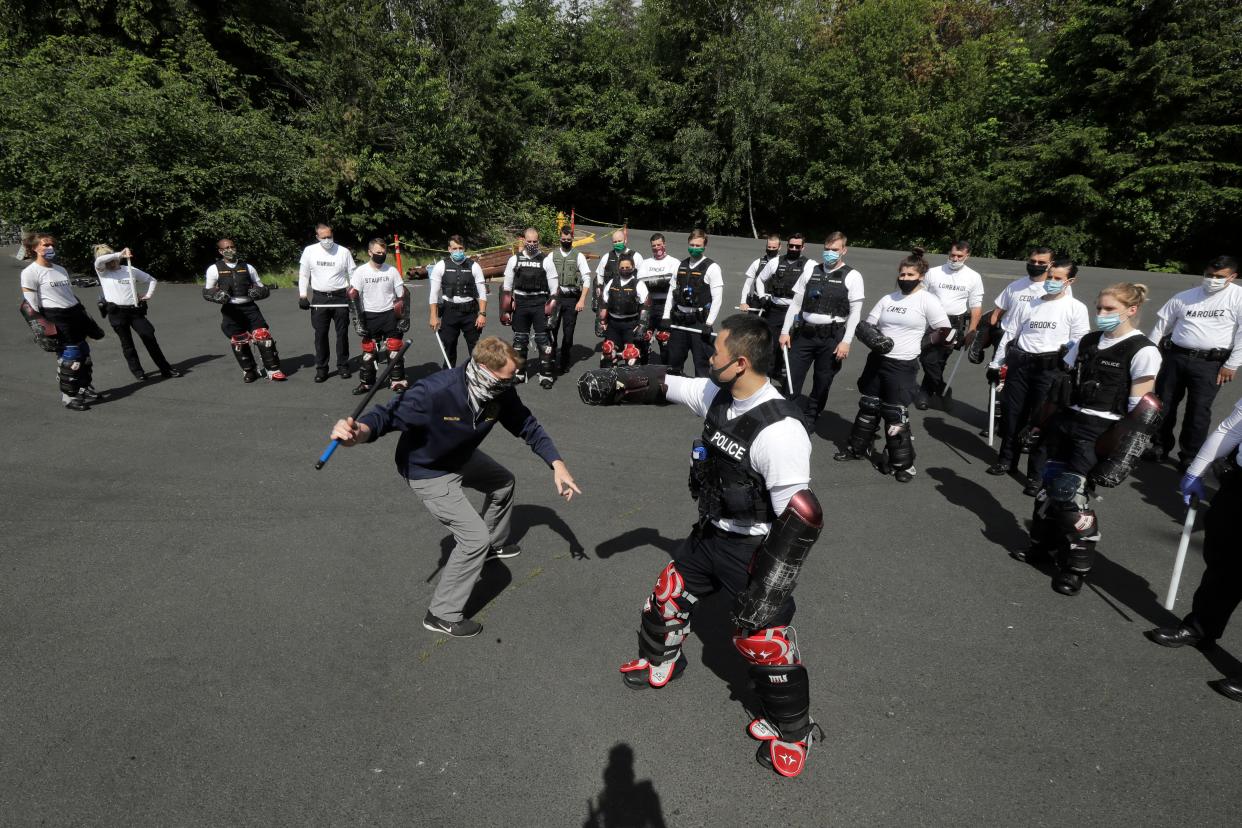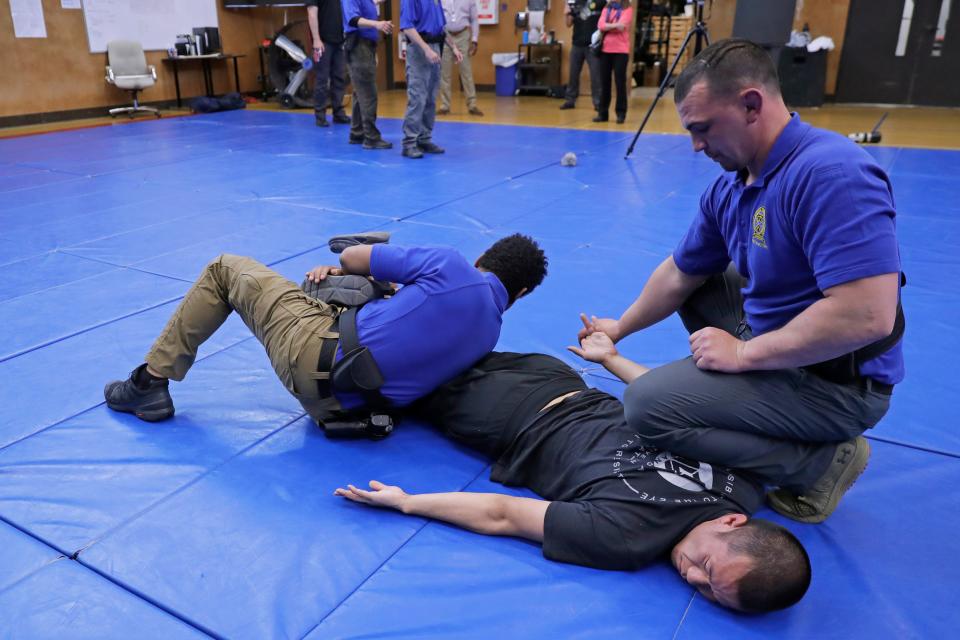Use education standards for police to lower rates of brutality, improve profession

- Oops!Something went wrong.Please try again later.
- Oops!Something went wrong.Please try again later.
- Oops!Something went wrong.Please try again later.
- Oops!Something went wrong.Please try again later.
Despite decades of advocacy, we have yet to see broad reaching and sustainable changes within law enforcement in America.
We've seen another cycle of profound protest against police misconduct. We've observed the appointments of multiple community task forces – each providing research and recommendations. We've witnessed calls for accountability and better police training, as well as exhaustive lists of antidotes to police brutality. Some cities have made significant cuts in police budgets to dramatically shift funding to social services.
Many of these ad hoc changes were warranted, but alone they are insufficient to deliver the needed transformation. In the 21st century, we remain in critical need of an overhaul to our methods of educating and developing our police officers.
Like many of their predecessors, 21st century police reform advocates are emotionally intelligent, data driven, socially aware and relentless in the pursuit of justice for all – especially those historically and disproportionately impacted by police brutality. Accountability is their armor, and evidence is their driver.
For generations, advocates, scholars and lawmakers have tried to reform a policing system deeply mired in the structure of unbalanced and unchecked power, only to be thwarted by those unwilling to yield force, listen to facts or share convenience.
We've been here before – multiple times:
In 1929, President Herbert Hoover and former U.S. Attorney General George W. Wickersham convened the first major investigation of police misconduct. This task force led to public safety recommendations. After two years of meticulous research on police practice, mostly in response to the enforcement of prohibition laws, the group of 11 members found major corruption in police culture, brutal interrogation tactics and communities discontent in all cities that enforced prohibition.
In the 1960s, President Lyndon Johnson created the President's Commission on Law Enforcement and Administration of Justice. Its final report issued in 1967 has been described as "the most comprehensive evaluation of crime and crime control in the United States at the time," with recommendations that led to sweeping reforms.
The Knapp Commission of 1970 was a five-member task force charged to investigate corruption within the New York Police Department. After two years of research, this group uncovered widespread and crippling corruption in law enforcement, resulting in more recommendations to clean it up. The report even classified two types of bad cops, "grass eaters" and "meat eaters,” where "grass eaters" were officers who were influenced by others to commit petty crimes and "meat eaters" were officers engaged in brutal and deliberate acts of corruption.
Forty years ago, the U.S. Commission on Civil Rights recommended police departments create and enforce early intervention that would identify risky behavior and the officers who exhibit it in order to reduce police harm.
And most recently, the Obama administration launched the President's Task Force on 21st Century Policing, resulting in a 2015 report that made 156 recommendations – 63 federal and 87 for state agencies. Half a decade later, we are still working to reinvent public safety.
Following the death of George Floyd, search results related to racial equity skyrocketed. Corporate America got involved, donating millions to social justice organizations. Major sports organizations used their platform to call attention to a problem that has existed for years.
Calls to “defund the police” centered on the proposal of reallocating law enforcement funding to other social services. Democratic leaders like President Joe Biden and former President Barack Obama have rejected the argument to defund, prioritizing politics over the movement. Yet the call to defund sheds light on the country’s greatest problems in policing – a lack of structural uniformity in the policies and pedagogy that govern public safety and the resulting injustice for the lives lost at the hands of misconduct.
SUBSCRIBE: Help support quality journalism like this.
Do those in power and with influence really want change, or are they willing to nibble around the edges and hope that quiets the restless? We must have a real conversation about anti-racism and evidence-based law enforcement, and then actually reject ineffective and unjust policies and practices, and enact new policies and implement new practices that will transform public safety in America.
Organizations like MEASURE and the American Society of Evidence-Based Policing have called for a scientific approach to police reform for years. MEASURE, a Black, woman-led advocacy organization, has held five public safety conferences (a collaborative effort by activists, police and researchers) in Texas and California, highlighting the importance of community-led research approaches to improving public safety, transformation through racial healing, data-driven public safety and evidence-based decision-making.

The opportunity to do a deep dive into the perpetual issues around American policing has led to a key conclusion: Smarter police reform must include smarter police.
We know there are several factors that go into why more people die at the hands of American police than cops from other countries, but ignoring the critical call for higher education attainment has had and will continue to have dire consequences.
The Prison Policy Initiative compared the killing of civilians by police across several countries, and here are two of their findings:
U.S. police kill approximately three times more people per 10 million than Canadian or Australian law enforcement and between approximately 15 and 165 times more than Japan, England and Wales, Germany, New Zealand or the Netherlands.
Iceland and Norway see zero deaths by police.
While the statistics can only account for the number of police killings and not explain them, we must critically examine the difference in the pathways to becoming a law enforcement officer globally. What is evident is that most of these countries have more extensive and intensive training programs than those in America.
Like Renee Mitchell, co-founder of the American Society of Evidence-Based Policing, several police researchers have called for a transformation of police education and the development of an American college of policing, similar to the United Kingdom's approach.
Maria Haberfeld, a professor of police science at the John Jay College of Criminal Justice, has also suggested we develop national standards and pointed to the three-year preliminary policing educational requirements in countries like Norway and Finland.
Dr. Obed Magny's research and evidence have led him on a path to our nation's need to prioritize emotional intelligence in the field. Jim Bueermann, a retired police chief and former president of the National Police Foundation, has spent years calling for scientific evidence to be translated into policy practice. Exploring these ideas can move America from merely examining the “best practices” in policing to actually implementing evidence-based police practices.
In the United States, officer training includes carrying a firearm, a taser, a baton and other tools that can inflict harm in vulnerable communities, and it can range from as little as 10 weeks to just more than a year. This is in stark contrast to the years required in most European countries, and there is no lack of research establishing the benefit of these practices. Numerous studies have evidenced that an officer's wellness, safety and professional standards increase with a bachelor's degree.

Educational attainment has a dramatic impact on police behavior. A 2010 study showed that educated officers are less likely to use force. The study also found evidence that educated officers had the potential for more creativity in approaches to dealing with the surrounding community.
In a separate study of disciplinary cases in Florida, the International Association of Chiefs of Police found that officers with four-year degrees accounted for only 11% of disciplinary actions. The bottom line is that a college degree could give police officers the greater perspective required to make them more effective and safe in the field of law enforcement.
The United States has military academies like West Point, The Citadel and the U.S. Naval Academy to train the very best to protect our nation's interests around the world. What's keeping us from creating the same kinds of four-year institutions to train the very best to protect human rights and public safety in America?
The country lacks a national set of education standards. The nearly 18,000 police departments in the country operate under vastly different policies, enforcement goals and interpretations of justice – which has led to a discombobulated understanding of police legitimacy and accountability. The gross lack of data and research to inform policy, tactics and procedures has consequently dug us into a hole of public safety complacency and disparity.
Enough is enough.
Today is the best day to brainstorm a new standard backed by the available evidence of what works internationally. Let the transformation begin.
Meme Styles is the president and founder of the award-winning nonprofit MEASURE, a public education and advocacy organization that empowers people to use data to tell their own story.
This article originally appeared on USA TODAY: National education standards for police would lower rates of brutality
